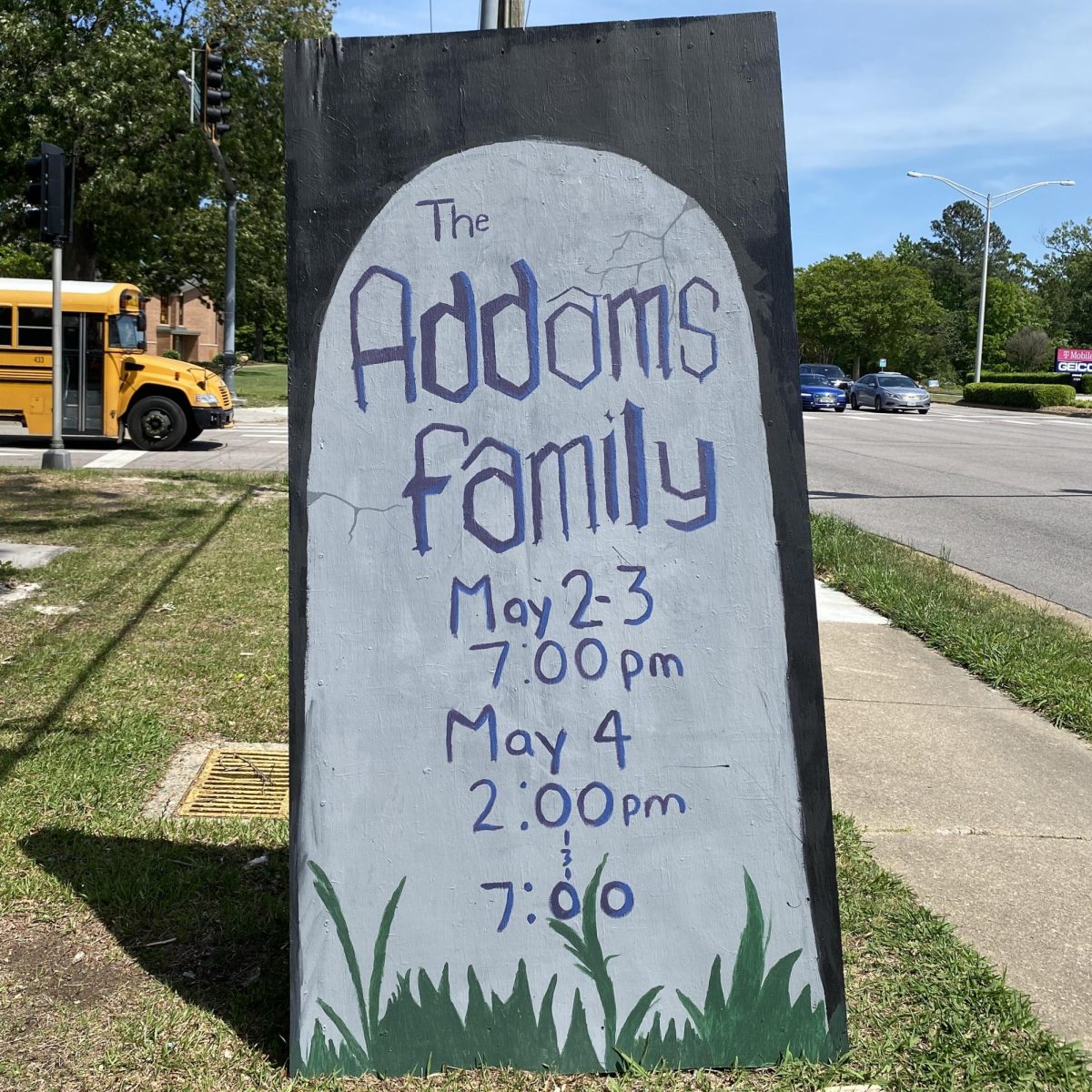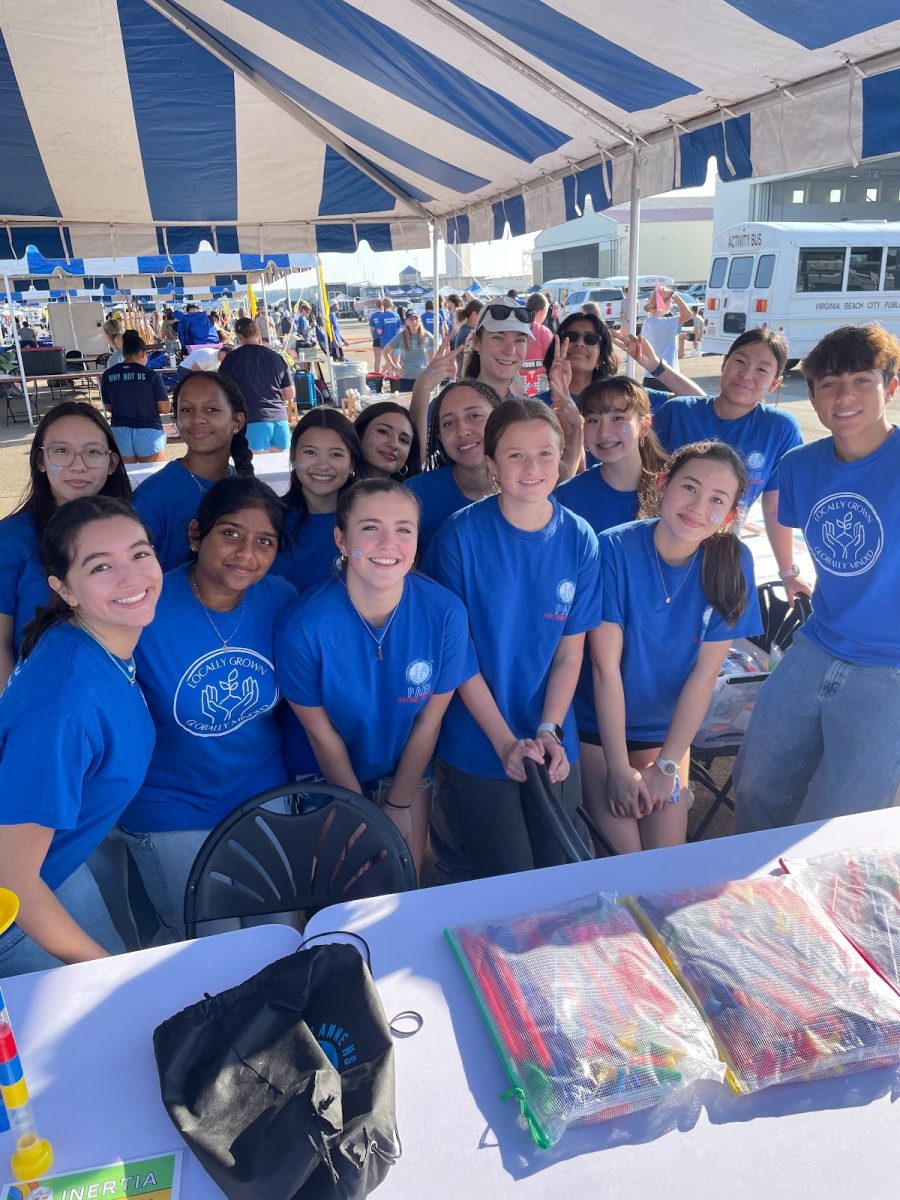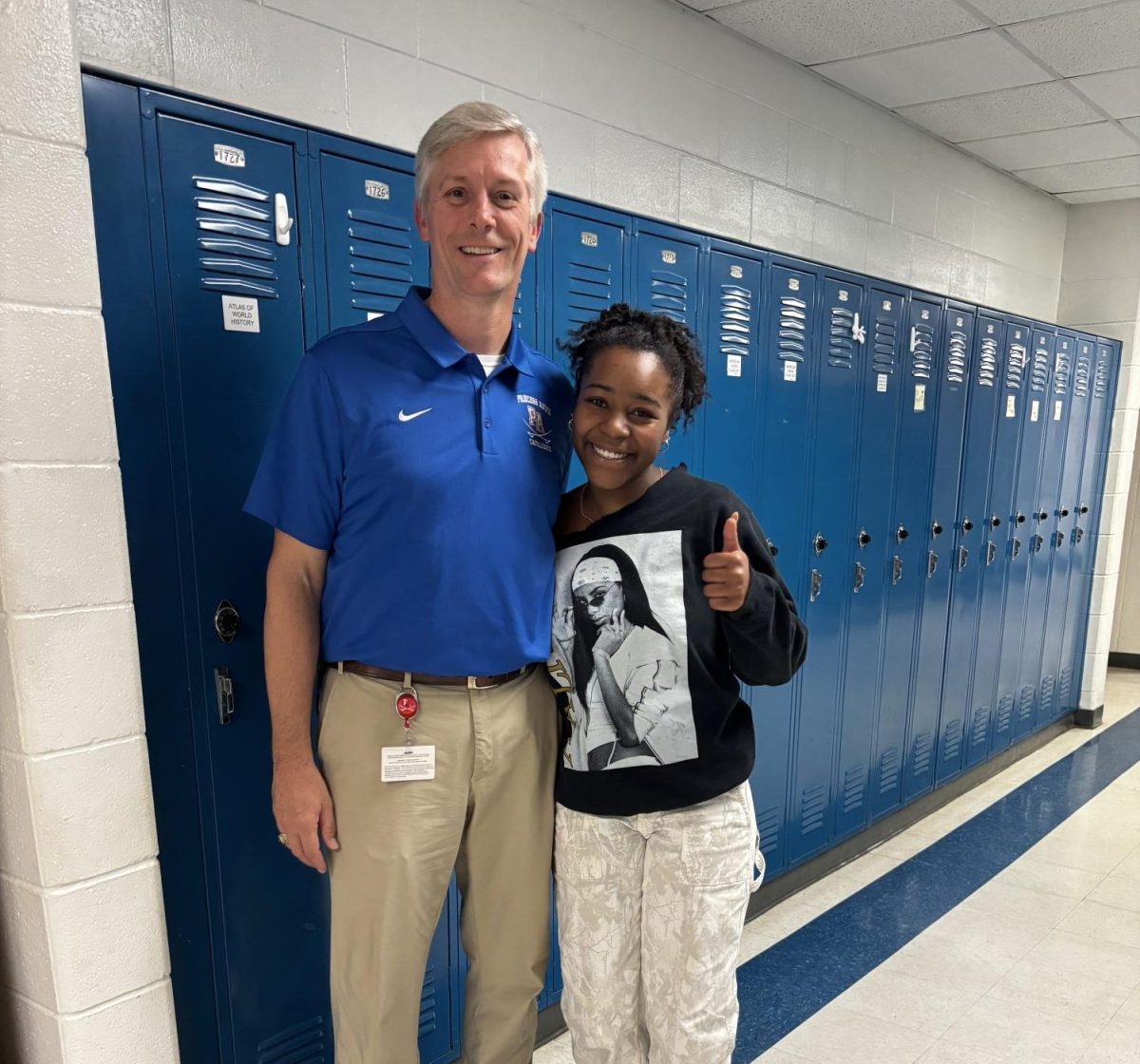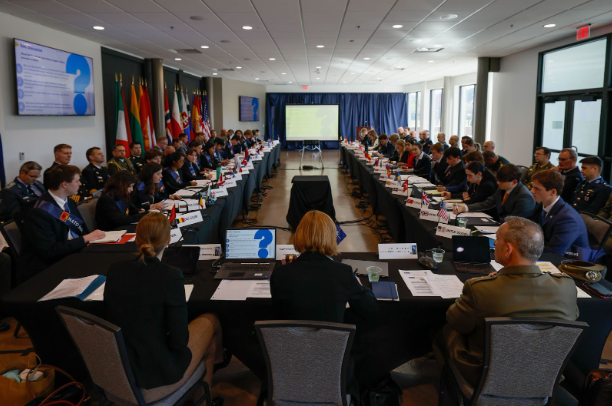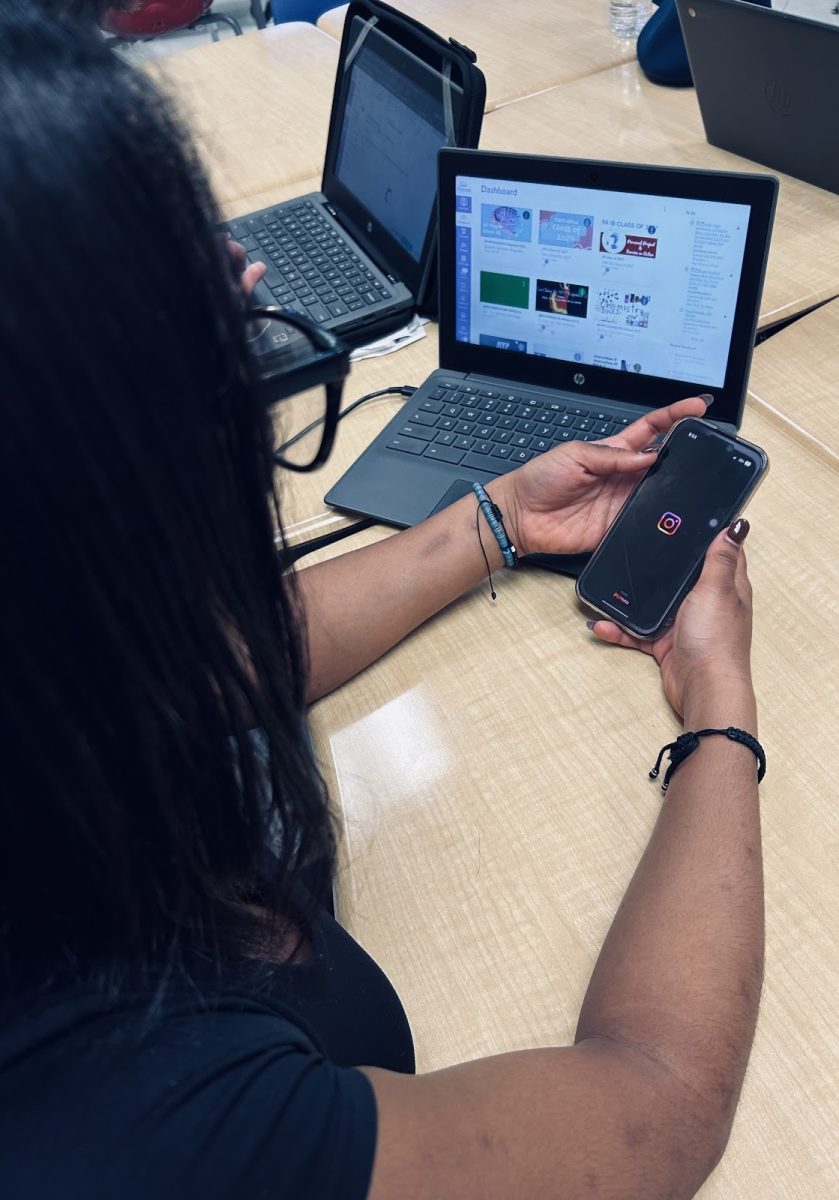PA’s spring musical ‘The Addams Family’ will open this Thursday, May 2, at 7 p.m., with further performances Friday at 7 p.m. and Saturday at 2 p.m. and 7 p.m. Tickets are available here and at the door.
The show is based on The Addams Family franchise, but imagines what would happen if Wednesday (the teenage daughter of the family) fell in love with a boy who is (at least seemingly) her polar opposite, according to Director of Vocal Music and chorus teacher Katie Davis, who oversees the singing and essentially acts as a producer, delegating roles and organizing finances and logistics.
“One of the main reasons that we [Davis and the Chorus Parents Association] chose ‘Addams’ is because we always like to choose something that will fill the seats. So something that people have heard of, nothing too obscure,” said Davis. Also, ‘The Addams Family’ would have been the last show in the current building if PA’s reconstruction had not been postponed, so Davis at the time looked for a show that didn’t require a lot of new costumes or set pieces.
According to Davis, although the musical usually falls on the last weekend in March or the first weekend in April, the fact that spring break was earlier this year as well as various other scheduling conflicts pushed the musical to the first weekend in May; scheduling should be more typical in the following years.
“It’s coming up really close, which is a little scary…honestly, I feel like everyone kind of feels that way every year,” said stage manager, senior Lauren Wilmoth. “So I guess just that’s just sort of the nature of doing musical; you always feel…behind, but we’re definitely working really hard to be ahead of things.” Pit orchestra conductor Alexander Kelly felt that “we are a lot further ahead than we usually are,” as in previous years the pit didn’t play with the actors onstage until the Monday of the final week, “which is terrifying, because there’s so many little details and timing cues…that you have to iron out. But this year, we started that [the week before show week].”
After choosing the musical, Davis explained that “vocal ability” and “the ability to take direction” were important factors when choosing the cast. During auditions, the judges (performing arts teachers) asked the auditioning students to read monologues in a variety of styles in order to see if they were “easy to work with” despite a lack of acting experience. Inversely, strong acting and dancing skills could make up for a lack of experience with singing, Davis described.
The audition process is one of Davis’ favorite aspects of the musical season, as “you get to see all this talent that you didn’t know existed. Every year we always have people who I’ve never heard sing before, and you would think…‘I’m the chorus teacher. I know who can sing in this building,’ and that’s not always the case.” Davis explained that casting the lead role, Wednesday, was difficult because there were “such big shoes to fill”–the role requires the actress to belt high notes, which typically requires vocal training from a young age.
Senior Hannah Taczak, who plays the Nurse in the Ensemble (Ancestors), said that compared to previous shows (‘Shrek’ in 2022 and ‘Matilda’ in 2023), ‘The Addams Family’ “is probably going to be one of our funniest and more interesting. It’s going to incorporate less intricate [choreography], and we’re going to…focus on…being our own character and embodying [them] to make sure that the show comes to life.”
Senior Daniel Sweeney, cast as Pugsley, Wednesday’s little brother, agreed, and additionally found “building your character” the most rewarding part of being in the musical: “It’s not just what the director tells you or what’s said in your script, but it’s also your own creative liberties.” Sweeney “decided to make my character kind of a little menace…He…scurries everywhere. He’s very obnoxious. He’s also kind of a snoop, because he tries to find out what’s happening in the family.”
Sweeney played a background character in ‘Shrek’ and found it more difficult than his lead role in ‘The Addams Family’ due to the challenge of reacting to the action onstage without spoken lines. “I think that ensembles are really important to musicals because they…bring the whole musical to life and make it a world,” explained Sweeney.
Senior Leah Hilliard, who plays the protagonist Wednesday, at first characterizes her as “very confident [in] who she is” but not physically expressive. Later on, as Wednesday’s romantic relationship develops (or as Wednesday describes it, “being pulled in a new direction”), Hilliard adds more emotions to her acting. “I feel like a lot of us highschoolers have dealt with that, so it’s very easy to translate that into my acting,” Hilliard explained.
Hilliard has been involved in theater since the age of three; after moving from New York to Virginia Beach in eighth grade, she continued her involvement by playing the Dragon in ‘Shrek’ as a sophomore and Tommy the following year in ‘Matilda.’ “Mrs. Davis really believed in me, so I tried my best to stay involved,” Hilliard said.
For Hilliard, something that sets ‘The Addams Family’ apart from PA’s previous shows is the separation of main cast and ensemble as well as the scenes themselves. “Apart, it seems very, very weird. But together…when you come to see the show…it’s very cohesive.” Hilliard also liked how the show has multiple interweaving plotlines in comparison to the straightforward plots of both ‘Shrek’ and ‘Matilda.’
On the technical side, Wilmoth explained that the set is one of the biggest challenges of the production because it involves “really grand scenes, like with the Addams family house, [where] we have to have a giant kitchen table and then…we have a whole house setup…There’s just a lot to do with that.”
Wilmoth’s favorite aspect of musical preparation is working with fellow stage manager Julia LaFountaine, explaining, “this is the last show we’re doing together, so we’re trying to make the best of it and make it the best thing that we’ve done.” After stage managing for ‘Matilda’ last year with LaFountaine, Wilmoth learned “how important it is to know exactly what’s happening on the stage” and to attend every rehearsal rather than divide and conquer.
According to Wilmoth, when doing tech “you have to really know how to keep your calm and keep your cool, because I think it’s really easy to become overwhelmed…When something isn’t going your way, it might seem like it’s the end of the world, but I think it’s really important to take a step back and just take a deep breath and focus.”
‘The Addams Family’ also presents challenges in its instrumental music. Kelly conducted both ‘Shrek’ and ‘Matilda’ in previous years, the former of which was his first time conducting a musical. “[‘Shrek’] was definitely a big learning experience. But over the years, I feel like as a department we’ve really homogenized and we’ve come together.” Kelly elaborated, “I definitely think that ‘Addams Family’ is much more challenging for the pit musicians [than ‘Shrek’ and ‘Matilda’]. There are some strange time signatures; the key signatures are equally unfriendly for both the band students and the orchestra students.”
Kelly’s biggest challenge is accounting for minor mistakes that might happen during the performance and “being able to catch the pit and tell them non-verbally…where we’re at and how they can come back in, so that way the audience doesn’t even know that anything happened.” Kelly explained that “if I miss something, then the pit messes up. And if the pit messes up, then the actors and singers on stage can miss their cue, and so I feel like if I start that domino effect, it could really, really spiral out of control.” Similarly, Kelly explained that to play effectively in the pit, “you need to learn your part, and so you have to be the best you can be on your instrument, because any kind of imperfection that you have in your playing is going to translate to the audience and to the people on stage. And in a show like a musical production, there’s really not a huge margin of error.”
Sophomore Abby Colbert, who plays electric bass for the pit, agreed: “[The music] is complicated and it is very, very different from any other type of music. It’s a lot of work, but it is a lot of fun.” Unlike the usual band or orchestra music that student musicians might be used to playing, ‘The Addams Family’ is influenced by jazz and swing styles; Colbert elaborated that musical theater involves “collaboration among everyone: among the tech backstage, moving things on and off, and the actors saying their lines…with sound effects.”
Colbert was a set chair for ‘Matilda,’ and she switched to pit because she “wanted to test out a new view on the musical. Not working backstage, but working in front of the stage…I was really inspired by seeing the professionals last year and seeing all the people I know in the pit…enjoying playing the music.” Colbert usually plays the viola in PA’s orchestra, so she also had to adjust to aspects unique to electric instruments such as the amp, speaker, and pedals: “It’s a whole different world playing the electric bass.”
Kelly felt that the most fulfilling part of his role is seeing students’ dedication to the musical. “We…live, sleep, eat, breathe the musical this season. And it can be really intense for them. It’s a lot of work, it’s demanding, it’s high-level music, but at the end of it…to see how much they’ve grown through the experience is really, really rewarding.”
Davis explained that she is already thinking about what shows could be done next year, keeping in mind rising seniors to fill major roles, while taking into account that not all students who are involved this year will audition again next year, and the possibility of “undiscovered talent that has yet to come out.”
“My hope…is that people come and see the show, and decide that they want to be a part of it. And that way we get talent that we didn’t know that we had,” said Davis. “And in turn, hopefully that would get more kids involved in our fine and performing arts programs, to make our programs bigger [and] stronger than ever.”
Sweeney would advise anyone interested in getting involved in the musical, “Just audition…Even if you’ve never acted before, just try out and you’ll figure it out while you’re in the musical. But also, if you do get in the musical, do practice a lot. Don’t just brush it off and say, ‘Oh, it’s easy.’ No, you’ve got to put the work in. Make it your goal.”
Hilliard “recommend[s] theater to everybody” because of the new experiences and relationships it provides. “It’s a collaboration of the whole fine arts department. The pit is from orchestra, chorus kids help with singing, and the theater department does set and things like that,” she explained. “So it’s like a very big community, and you could almost never feel alone in it.”
Sweeney agreed that despite the hard work involved, “It really becomes a family once you’re in it, if you commit to it…Whether you take a class or not, you’ll still feel [like] part of the family; whether you’re in tech or…an actor, you’ll be included.”



